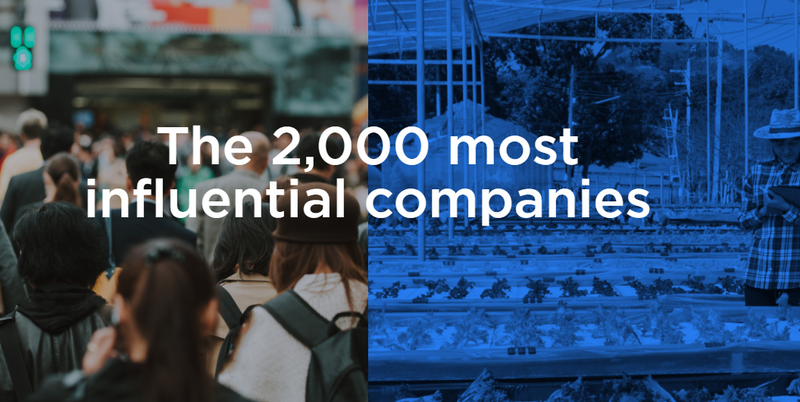
$50bn SDG-targeted investment proposals at SDG Investment Fair
Over 100 SDG-aligned projects with a total investment scope of $ 50 billion have been presented during the ...

Five Egyptian companies were placed on the SDG2000 which has been recently issued by the World Benchmarking Alliance to highlight the most influential companies in the sustainability score.
The five Egyptian companies are Banque Misr, Telecom Egypt, the Egyptian General Petroleum Corporation (EGPC), the Egyptian Electricity Holding Company (EEHC) and the National Bank of Egypt (NBE).
The SDG2000 list identifies the 2,000 most influential companies, from Algeria to Vietnam. These are the companies that are going to shape the future as they collectively make up half of the entire global economy and are responsible for $43 Trillion in revenue.
The private sector is critical to achieving the United Nations’ Sustainable Development Goals by 2030.
The United Arab Emirates (UAE) came at the top of Arab states placed on the list. The list comprised 10 UAE companies; namely Abu Dhabi Investment Authority (ADIA), Abu Dhabi National Oil Company (ADNOC), Emaar Properties, Emirates Group, Emirates Integrated Telecommunications Company (du), Emirates Telecommunications Group (Etisalat), FinabIr (UAE Exchange), First Abu Dhabi Bank, Investment Corporation of Dubai (ICD), and Mubadala Development Company.
Saudi Arabia came in the second position among Arab states with the list including nine Saudi companies; namely the General Organization for Social Insurance (GOSI), Mobile Telecommunications Company, the National Commercial Bank, the Public Investment Fund/ Sanabil Investments, SAMA Foreign Holdings, Saudi Aramco (SABIC), the Saudi Electricity Company (SEC), the Saudi Telecom Company (TC), and Savola Group.
Egypt came in the third position along with Morocco which also had five companies on the list; namely Attijariwafa Bank, Banque Centrale Populaire, BMCE Bank, Itissalat Al Maghrib (Maroc Telecom), and OCP for chemicals.
Kuwait came in the following position with four companies on the list; namely the Kuwait Investment Authority, Kuwait National Petroleum Company, Kuwait Petroleum Corporation (Q8), and Zain Group.
The list also comprised two Omani companies; Oman Telecommunications Company (Omantel) and Petroleum Development Oman (PDO).
The Iraq National Oil Company (INOC) was also placed on the list alongside the National Oil Corporation of Libya and the Palestine Telecommunications (PalTel).
The SDG2000 list also included seven African states; South Africa, Nigeria, Gambia, Ethiopia, Kenya, Tanzania and Sudan.
About 23 South African companies were placed on the list; namely Absa Group, Bidcorp, Bidvest Group, Diggersrest Timber Company, Eskom Holdings, Nedbank Group, Old Mutual, Pick N Pay Stores, PPC, Public Investment Corporation (PIC), RCL Foods, Sanlam, Sappi, Sasol, Shoprite Holdings, Standard Bank, Steinhoff International, Telkom, The Foschini Group (TFG), Tiger Brands, Tongaat Hulett, Wilson Bayly Holmes, Woolworths Holdings.
The list also included five Nigerian companies; Dangote Industries, Flour Mills of Nigeria, Globacom Nigeria (Glo), Jumia, the Nigerian National Petroleum Corporation (NNPC).
The list also comprised two Kenyan companies; Safaricom and Telkom Kenya, alongside Ethio Telecom of Ethiopia, Sudatel Telecom Group of Sudan, the Tanzania Electric Supply Company Limited (TANESCO) and Africell of Gambia.
The list has also comprised companies from many world countries, including the US, the UK, Australia, Austria, China, Japan, Canada, Netherlands, France, Germany and Sweden.
The SDG2000 List identified the keystone companies within seven systems transformations; financial, circular, social, decarbonization, food and agriculture, digital and urban. The list went beyond just size, by also looking at impact and influence.
The World Benchmarking Alliance (WBA) seeks to generate a movement with an aim to increase the private sector’s impact towards a sustainable future for all. The WBA is now working to incentivize and accelerate companies’ efforts towards achieving the 17 United Nations Sustainable Development Goals.
Over 100 SDG-aligned projects with a total investment scope of $ 50 billion have been presented during the ...
Global electric car sales are set to hit around 17 million by the end of ...
Ericsson Canada marked the Earth Day by joining the Environment and Climate Change Canada’s (ECCC) Net-Zero ...


اترك تعليقا